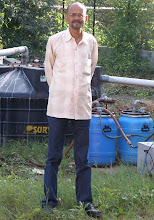Treatment and proper disposal of municipal solid waste (MSW) is a tough task for civic bodies all over India. In a city like Pune, around 1400 Tons of MSW is generated per day. Presently, the waste generated in Pune is just dumped at a dumping ground near ‘Devachi Urali’ at Phursungi, Pune. As a responsible civilian, it is our duty to reduce waste generation and dispose our waste generated at our own level. It is possible to do so using simple cost effective methods.
MSW mainly consists of roughly 50% non biodegradable and 50% biodegradable waste. Non- biodegradable waste like plastic, metal and glass is reused/ recycled in various ways. Biodegradable waste treatment can be efficient if done in a decentralized manner. Biomethanation (biogas production), vermicomposting and aerobic degradation are some routinely used methods, used for treatment of biodegradable waste.
Biogas Generation
Biogas is generated by bacteria in the process of biodegradation of organic material under anaerobic conditions. This process creates methane that can be captured and used to either run thermal appliances (cooking) or to create electricity by feeding the methane to generators.
Biogas can be created from a wide variety of biomass (starch and sugar based). These can range from energy crops, crop refuse and waste. The use of waste such as manure and kitchen waste to create energy is an aspect that makes biogas especially relevant in the context of rural India.
MSW mainly consists of roughly 50% non biodegradable and 50% biodegradable waste. Non- biodegradable waste like plastic, metal and glass is reused/ recycled in various ways. Biodegradable waste treatment can be efficient if done in a decentralized manner. Biomethanation (biogas production), vermicomposting and aerobic degradation are some routinely used methods, used for treatment of biodegradable waste.
Biogas Generation
Biogas is generated by bacteria in the process of biodegradation of organic material under anaerobic conditions. This process creates methane that can be captured and used to either run thermal appliances (cooking) or to create electricity by feeding the methane to generators.
Biogas can be created from a wide variety of biomass (starch and sugar based). These can range from energy crops, crop refuse and waste. The use of waste such as manure and kitchen waste to create energy is an aspect that makes biogas especially relevant in the context of rural India.

I have read your article from agrowon about crop change. I have question about biogas plant. Is it possible to use waste food as feedstock in old kind of biogas plants where only cow dung is used as feedstock?
ReplyDelete